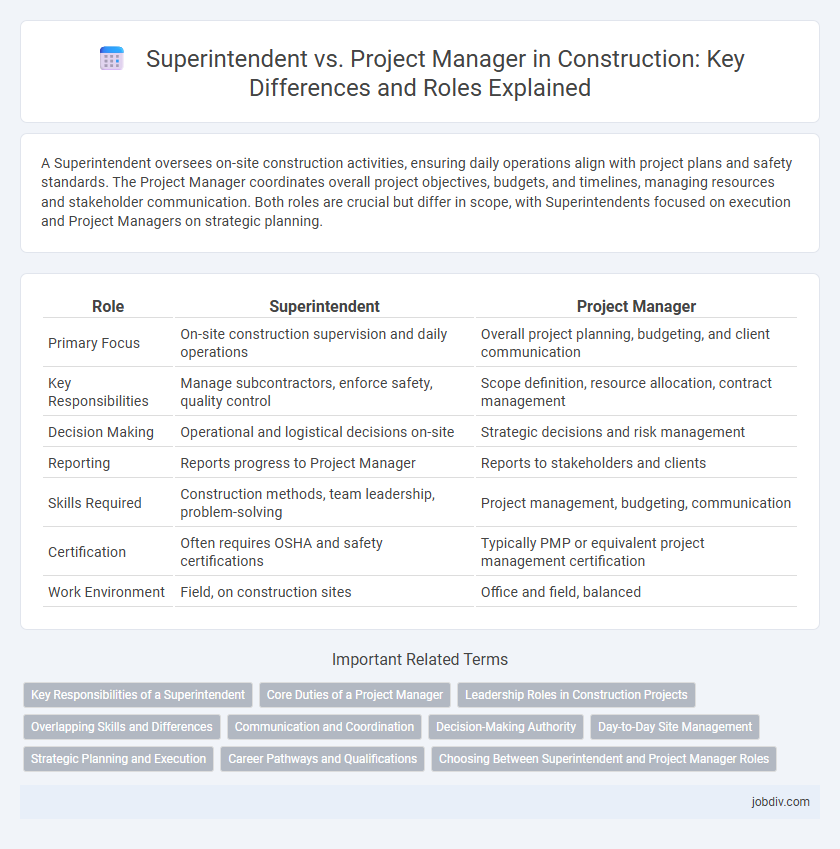A Superintendent oversees on-site construction activities, ensuring daily operations align with project plans and safety standards. The Project Manager coordinates overall project objectives, budgets, and timelines, managing resources and stakeholder communication. Both roles are crucial but differ in scope, with Superintendents focused on execution and Project Managers on strategic planning.
Table of Comparison
| Role | Superintendent | Project Manager |
|---|---|---|
| Primary Focus | On-site construction supervision and daily operations | Overall project planning, budgeting, and client communication |
| Key Responsibilities | Manage subcontractors, enforce safety, quality control | Scope definition, resource allocation, contract management |
| Decision Making | Operational and logistical decisions on-site | Strategic decisions and risk management |
| Reporting | Reports progress to Project Manager | Reports to stakeholders and clients |
| Skills Required | Construction methods, team leadership, problem-solving | Project management, budgeting, communication |
| Certification | Often requires OSHA and safety certifications | Typically PMP or equivalent project management certification |
| Work Environment | Field, on construction sites | Office and field, balanced |
Key Responsibilities of a Superintendent
Superintendent in construction oversees daily site operations, ensuring compliance with safety regulations, quality standards, and project schedules. They coordinate subcontractors, manage on-site personnel, and monitor material deliveries to maintain workflow efficiency. Their role demands proactive problem-solving to address on-site challenges and promote seamless construction progress.
Core Duties of a Project Manager
A Project Manager in construction oversees project planning, budgeting, and scheduling to ensure timely and cost-effective completion. They coordinate between clients, architects, and subcontractors while managing risk and quality control throughout the project lifecycle. Their core duties include resource allocation, contract administration, and performance monitoring to align project outcomes with organizational goals.
Leadership Roles in Construction Projects
Superintendents oversee daily construction site operations, ensuring adherence to schedules, safety protocols, and quality standards, while Project Managers coordinate overall project planning, budgeting, and stakeholder communication. Effective leadership in construction relies on the Superintendent's hands-on management and the Project Manager's strategic decision-making to drive project success. Both roles are critical for maintaining workflow efficiency and achieving project objectives within scope and budget.
Overlapping Skills and Differences
Superintendents and project managers in construction share core skills such as team leadership, scheduling, and budget management, ensuring projects adhere to timelines and financial plans. However, superintendents primarily focus on on-site operations, directly overseeing daily construction activities and coordinating labor, whereas project managers emphasize strategic planning, client communication, and overall project delivery. While both roles require problem-solving and risk management, the project manager handles broader project scope decisions, and the superintendent ensures execution aligns with those plans.
Communication and Coordination
Superintendents lead on-site communication by directly coordinating daily activities among subcontractors, suppliers, and labor to ensure project milestones are met efficiently. Project Managers oversee broader communication channels, integrating information flow between clients, stakeholders, and the construction team to maintain alignment with project goals and budgets. Effective collaboration between Superintendents and Project Managers enhances project accountability and streamlines problem-solving throughout construction phases.
Decision-Making Authority
Superintendents hold primary decision-making authority onsite, managing daily construction operations, resource allocation, and safety compliance to ensure project milestones are met. Project Managers oversee broader strategic decisions such as budgeting, contract negotiations, and client communications, directing overall project progress and addressing high-level challenges. Both roles require collaboration but differ significantly in scope, with Superintendents focusing on execution and Project Managers on planning and coordination.
Day-to-Day Site Management
Superintendents oversee daily site operations, coordinating subcontractors, ensuring safety compliance, and managing on-site labor to maintain project timelines. Project Managers handle broader responsibilities including project planning, budgeting, stakeholder communication, and contract management. Effective construction projects rely on superintendents' hands-on site supervision complemented by project managers' strategic oversight.
Strategic Planning and Execution
Superintendents excel in on-site execution, managing daily construction activities to ensure adherence to project schedules and quality standards. Project Managers focus on strategic planning, coordinating resources, budgeting, and stakeholder communication to align project goals with business objectives. Effective collaboration between a Superintendent and Project Manager integrates high-level strategy with operational efficiency, driving successful construction project completion.
Career Pathways and Qualifications
Superintendents typically advance from field-based roles such as foreman or site engineer, requiring strong hands-on experience and trade knowledge, while Project Managers often follow a pathway through engineering or construction management degrees complemented by certifications like PMP or CCM. Superintendents prioritize skills in team coordination, safety compliance, and daily site operations, whereas Project Managers focus on budgeting, client communication, and overall project delivery timelines. Both roles benefit from continuous professional development, but Project Managers usually require advanced knowledge in contract management and risk assessment.
Choosing Between Superintendent and Project Manager Roles
Choosing between superintendent and project manager roles depends on your expertise in on-site supervision versus overall project coordination. Superintendents excel in managing daily construction activities, ensuring safety compliance, and directly overseeing labor forces on the job site. Project managers focus on budget control, scheduling, client communication, and coordinating subcontractors to deliver the project on time and within budget.
Superintendent vs Project Manager Infographic

 jobdiv.com
jobdiv.com